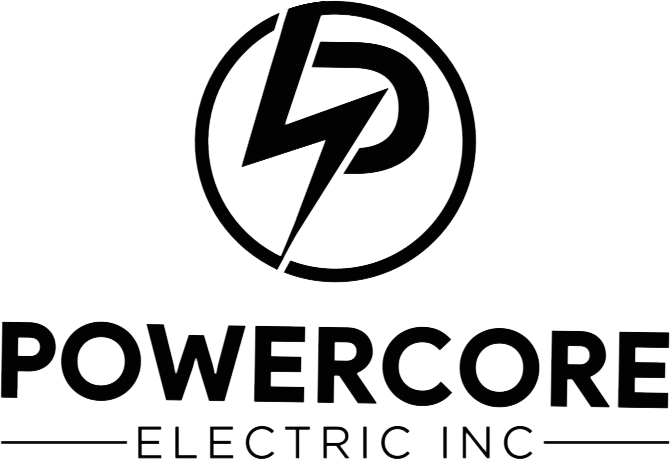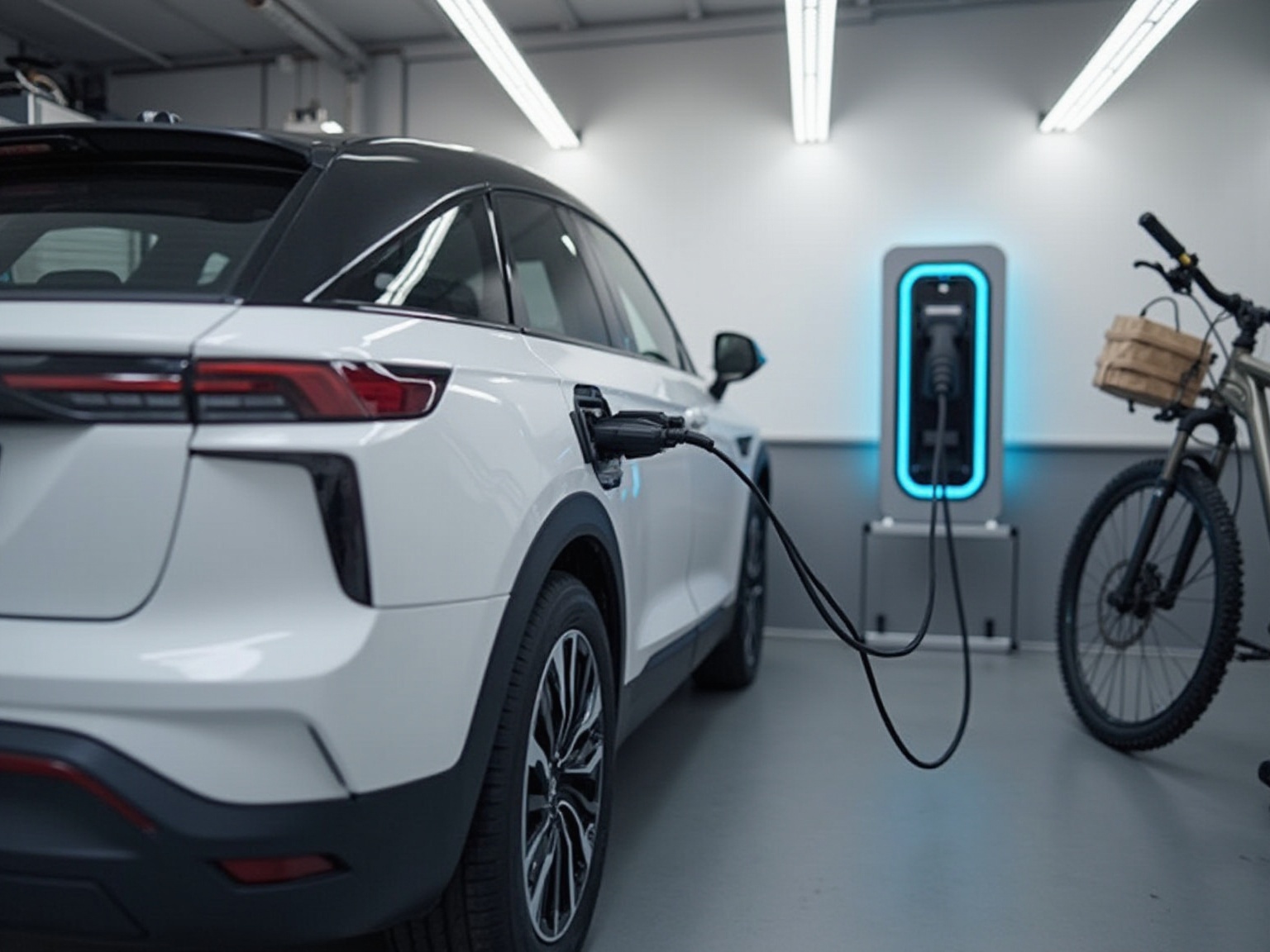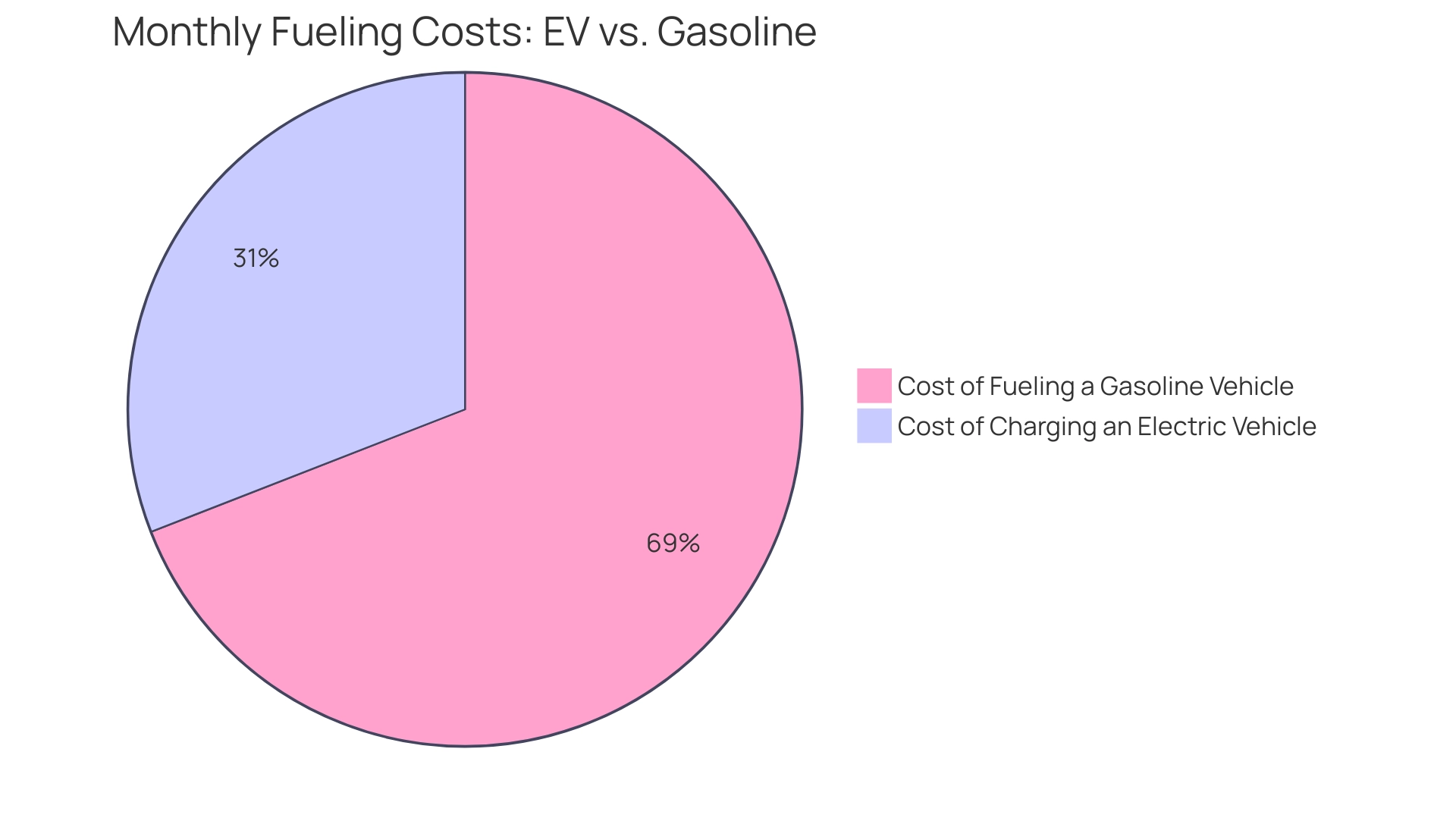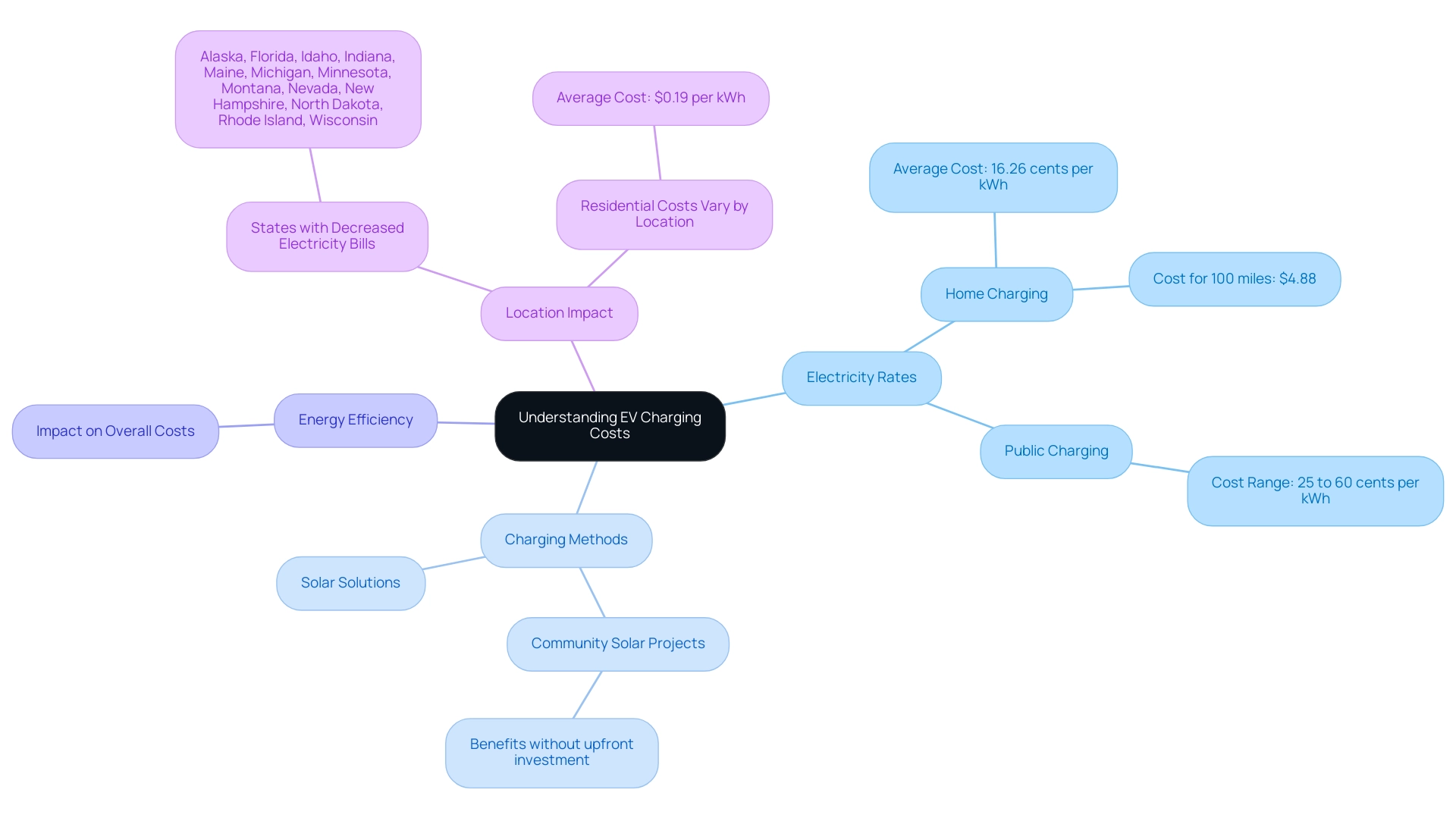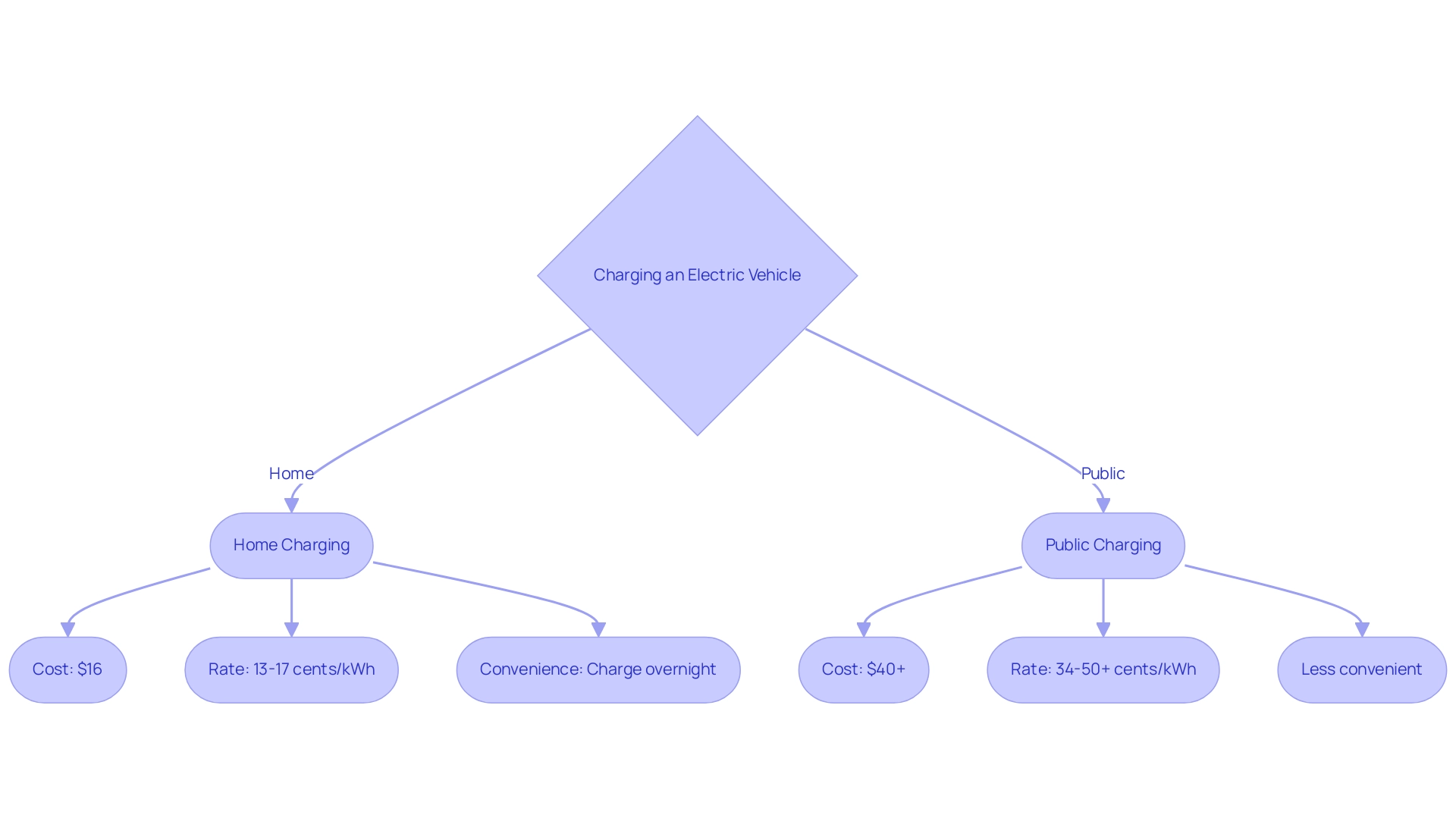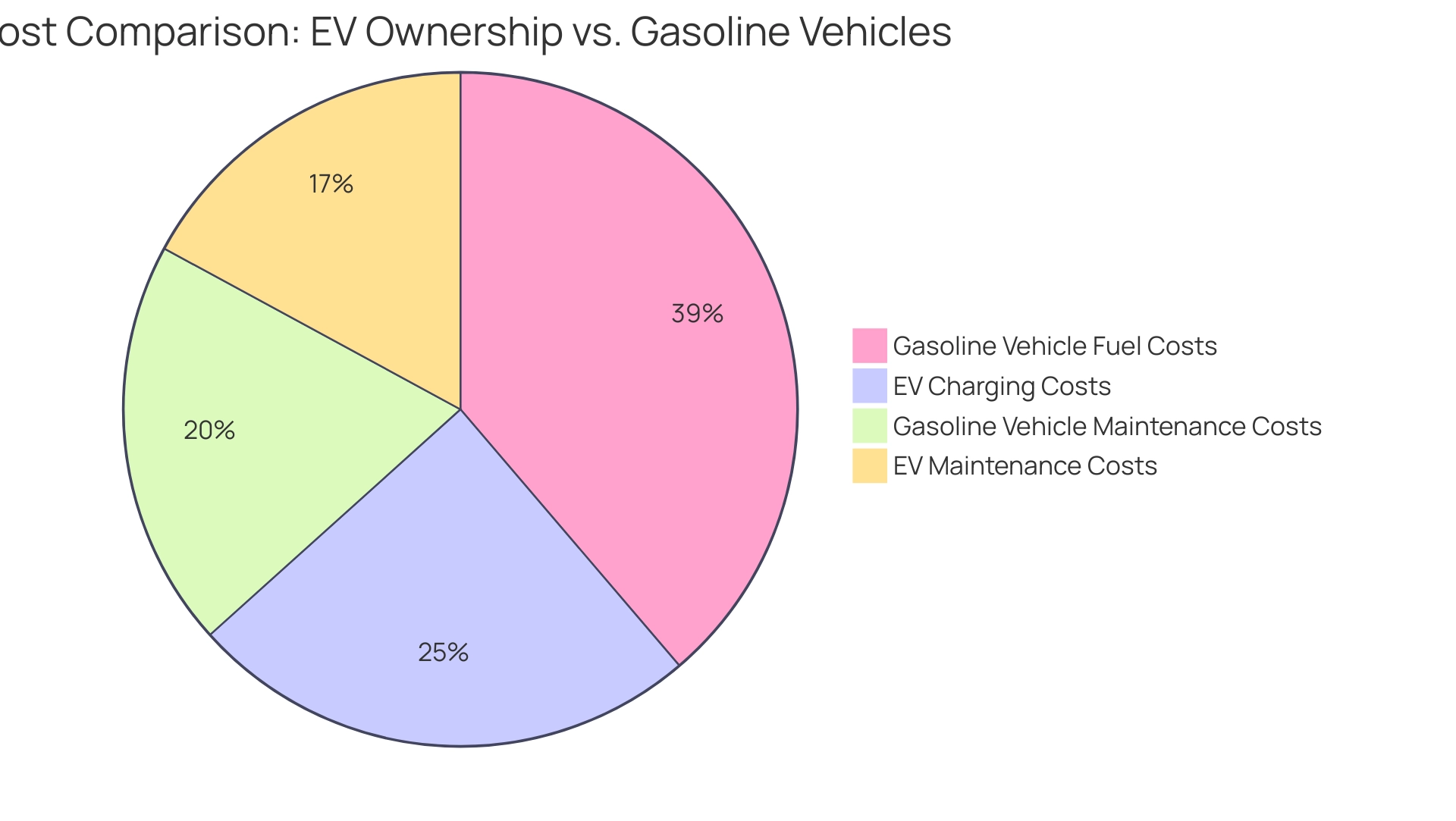Overview
We understand that managing energy bills can be a source of concern for many homeowners. The good news is that the cost to charge an electric car is significantly lower than the cost to fuel a gasoline vehicle, with average monthly expenses of approximately $70.72 for electricity compared to $158 for gasoline. This difference not only alleviates financial stress but also highlights the potential for savings that can enhance your energy independence.
Moreover, the benefits of home charging and the potential for further savings through solar energy solutions make electric vehicle ownership even more appealing. By embracing these sustainable options, you can contribute to a greener future while enjoying the economic advantages they offer. Together, we can explore how these solutions can work for you, ensuring that you feel supported every step of the way.
Isn’t it time to take control of your energy habits? Let’s work towards a brighter, more sustainable future together.
Introduction
As the automotive industry experiences a significant transformation, we understand that many are grappling with the rising costs associated with fueling their vehicles. The debate between electric vehicles (EVs) and traditional gasoline cars is more pressing than ever, especially in light of soaring gasoline prices. It’s common to feel overwhelmed by these changes, but understanding the financial implications of your fueling options can empower you to make informed decisions. This article explores the comparative costs of charging an electric vehicle versus refueling a gasoline car, revealing how savvy consumers like you can save significantly over time.
Imagine the peace of mind that comes with knowing your energy expenses are under control. From the nuances of home charging versus public charging stations to the long-term financial benefits of EV ownership, we invite you to discover how transitioning to electric mobility not only contributes to a sustainable future but also enhances your financial well-being. Together, we can navigate this evolving landscape of energy consumption, ensuring that your choices align with both your budget and your environmental values. Let’s explore these insights that can empower you to make choices that reflect your commitment to a greener future.
Understanding the Cost Dynamics: EV Charging vs. Gasoline
The expense of refueling an automobile is a significant concern for many drivers, and with the rising popularity of electric vehicles (EVs), an intriguing comparison arises regarding the cost to charge an electric car versus gasoline. Typically, powering an electric car is far more cost-effective than refueling a traditional internal combustion engine (ICE) vehicle. For example, if you drive 1,000 miles each month in an EV that achieves an efficiency of 3 miles per kWh, your monthly electricity expense would be approximately $56.47.
In contrast, the average monthly cost to fuel a gasoline vehicle hovers around $158. This stark difference highlights the substantial savings potential for EV owners, particularly in regions where gasoline prices are high.
Moreover, the financial dynamics of refueling can vary based on electricity rates and the time of day. Chris Hardesty, a senior advice editor, wisely notes, “Be mindful of time-of-day pricing differences at public charging stations.” Charging rates at public stations can fluctuate, with peak hours often leading to higher costs.
However, many EV drivers prefer to charge their vehicles at home overnight, often utilizing rooftop solar systems from Powercore Electric to further alleviate their fuel expenses. Powercore Electric provides solar panel installation and battery backup solutions that enhance energy independence, contributing to significant long-term savings and reinforcing the financial advantages of EV ownership.
Real-world examples vividly illustrate these savings. For instance, a case study involving Hypercharge EV Solutions showcases how businesses and multi-residential properties can optimize their infrastructure, making it easier for users to access affordable options. By streamlining the charging process, they improve accessibility for EV users, ultimately encouraging the transition to electric transportation and aiding in savings for users.
In summary, the financial benefits of electric vehicle power supply become clear when comparing the cost to charge an electric car versus gasoline. With an average monthly expense of approximately $70.72 for electricity compared to $158 for gasoline, the cost to charge an electric car consistently demonstrates that EV ownership is a more economical choice for eco-conscious drivers looking to reduce fuel spending. Additionally, integrating solar panels and battery backups from Powercore Electric can further enhance these savings, making it an appealing option for homeowners in California.
For detailed pricing on Powercore Electric’s solar panel installation and EV station services, we encourage potential customers to reach out to Powercore Electric directly. Together, we can explore sustainable solutions that benefit both your wallet and the environment.
Breaking Down EV Charging Costs: What You Need to Know
Charging an electric vehicle (EV) can often raise concerns about expenses, particularly regarding electricity rates, charging methods, and the vehicle’s energy efficiency. As of March 2025, the average price of electricity in the U.S. is approximately 16.26 cents per kWh. Have you considered how much it costs to charge your EV? For instance, if an EV consumes 30 kWh to travel 100 miles, the expense to charge would be around $4.88 for that distance.
We understand that expenses can fluctuate considerably based on the power delivery method utilized. Home power typically offers a more economical option, especially when combined with solar energy solutions. In contrast, public stations can cost between 25 to 60 cents per kWh, influenced by factors such as location and power speed.
Moreover, the efficiency of the EV itself is crucial in determining overall outlays. A more energy-efficient mode of transport will require less electricity to cover the same distance, ultimately lowering power costs. It’s common to feel uncertain about the evolving landscape of electricity rates, but some states, including Alaska and Florida, are experiencing a decrease in electricity bills.
This positive trend can significantly impact EV charging expenses, making electric vehicles even more appealing to potential owners. Community solar projects also present an innovative solution for those unable to install rooftop solar panels. These initiatives allow participants to benefit from solar energy without the hefty upfront investment, providing both financial and environmental advantages on a smaller scale. As Casey McDevitt points out, ‘Residential electricity prices average about $0.19 per kWh in the U.S., but what you pay for your power depends on where you live,’ underscoring the importance of location in determining electricity rates.
Understanding these elements is vital for prospective EV owners as they evaluate their anticipated monthly expenditures and compare the cost to charge an electric car versus gas. With the average residential electricity price in the U.S. being around $0.19 per kWh, the cost to charge an electric car versus gas highlights the increasingly favorable financial implications of switching to an electric vehicle, especially in regions where electricity rates are lower. Additionally, residents looking to lower high electricity bills can contact their provider for assistance or explore cheaper rates in deregulated areas.
As the market continues to evolve, staying informed about the elements of EV expenses will empower consumers to make more sustainable and economical choices. For those interested in installing a Tesla Level 2 home charger or exploring solar panel options, together we can ensure a seamless transition to efficient energy use. Powercore Electric offers comprehensive installation services, providing the guidance and support you need to embrace this change.
Home Charging vs. Public Charging: Which is More Cost-Effective?
Energizing an electric vehicle presents a crucial decision point for many homeowners: should you utilize your home energy supply or rely on public charging stations? We understand that when considering the cost of charging an electric car versus gas, home power supply often emerges as the more economical choice, with average electricity rates ranging from 13 to 17 cents per kWh. In stark contrast, charging at public power stations can involve fees exceeding 34 cents per kWh, with fast chargers frequently surpassing 50 cents per kWh.
For instance, the cost to charge an electric car versus gas indicates that fully charging an electric vehicle at home may require approximately $16, while the same charge at a public fast charger could rise to $40 or more. This financial reality can be overwhelming, but the convenience of home charging enhances its appeal. Imagine being able to charge your vehicle overnight, taking advantage of lower electricity rates during off-peak hours. This not only results in substantial savings but also aligns with sustainable power practices. In fact, about one-third of electric car drivers have installed rooftop solar systems, further alleviating fuel expenses and reducing environmental impact.
Powercore Electric, a locally-owned business, is here to provide customized solar solutions, including solar panels and battery backups, to assist homeowners like you in maximizing your savings and sustainability. By investing in these solutions, you can take control of your energy expenses and contribute to a greener future.
Real-world examples illustrate these savings effectively. For instance, powering a 2024 Kia EV9 GT-Line four times a week at home would add approximately $271.73 to your monthly energy bill—a stark contrast to the higher costs associated with public electricity use. This financial benefit emphasizes the importance of investing in a home power station, particularly for those who often drive and want to understand the cost to charge an electric car versus gas.
Furthermore, the Grizzl-E Duo Level 2 Plug-in EV Charger acts as a practical home power solution, designed for effortless energy sharing between two EVs. While it may lack internet connectivity and smart functions, its durable design and ability to charge two vehicles simultaneously make it a practical choice for households with multiple EVs. Expert opinions reinforce this perspective, emphasizing the cost-effectiveness of home charging solutions over public alternatives.
By opting to charge at home, you not only save money but also contribute to a more sustainable power future. Powercore Electric is committed to unmatched quality craftsmanship and customer-first service, ensuring that you feel supported every step of the way.
Customer testimonials highlight the positive experiences with Powercore Electric’s services, showcasing how homeowners have benefited from the installation of solar panels and battery backups, further enhancing their savings. By incorporating solar battery backups into their power solutions, homeowners can store surplus power generated during the day, leading to even greater savings and sustainability. Together, let’s work towards a comprehensive approach to energy management that positions Powercore Electric as a leader in providing effective and eco-friendly solutions for California communities.
Long-Term Financial Implications: EV Ownership vs. Gasoline Vehicles
The financial landscape for electric modes of transport (EVs) is becoming increasingly favorable, especially when we consider the long-term savings compared to gasoline vehicles. We understand that the initial costs of charging an EV may seem daunting, but the cumulative financial advantages are truly remarkable. For instance, the average yearly cost to charge an electric car is approximately $485, which is significantly less than the $1,117 spent on gasoline for traditional vehicles. This difference in fuel expenses can lead to substantial savings over time, easing the burden of energy bills.
Moreover, EVs typically involve lower maintenance expenses due to their simpler mechanics, which feature fewer moving parts and eliminate the need for oil changes. Recent analyses suggest that the average yearly upkeep expense for electric cars is around $300, in contrast to $600 for gasoline cars. This disparity highlights the potential for significant savings in upkeep, further enhancing the financial appeal of EV ownership.
Real-world examples illustrate these savings effectively. For example, a study indicated that a family shifting from a gasoline vehicle to an electric model saved over $1,000 each year when considering both fuel and upkeep expenses. Additionally, with the Inflation Reduction Act providing up to $7,500 in tax credits for new EVs assembled in North America, the initial investment becomes even more manageable. This support encourages more consumers to make the switch, fostering a community of eco-conscious individuals.
Furthermore, the expense of installing a Tesla Level 2 home charger can vary, typically ranging from $1,000 to $2,500, depending on installation specifics. We understand that this initial expense can be concerning, but it can be balanced by the savings on fuel and upkeep over time. When paired with solar-powered heating solutions, California homeowners can further lower utility expenses. By harnessing solar power, you can charge your EVs at a reduced cost, maximizing your savings and improving efficiency.
Charging during off-peak hours can further decrease expenses, making it an essential strategy for consumers looking to maximize their savings. As Chris Harto, a senior transportation and energy policy analyst at Consumer Reports, observes, “For buyers, it’s truly a question of, what’s the [long-term] return on that additional expense?” This perspective reinforces the idea that the long-term return on the initial expenses of EVs and home charging solutions is becoming increasingly advantageous.
Furthermore, the case study on lowering EV insurance expenses highlights another area where consumers can save. By comparing quotes from multiple providers and ensuring eligibility for discounts, EV owners can secure affordable insurance without compromising coverage. As the market for electric vehicles continues to expand, the financial incentives and savings associated with EV ownership, alongside the benefits of solar energy, are expected to grow. Together, we can make informed decisions that reduce overall transportation costs while contributing to a sustainable future.
Conclusion
We understand that the rising costs of energy bills can be a significant concern for many homeowners. The analysis of electric vehicle (EV) charging versus traditional gasoline fueling reveals a clear financial advantage for EV owners. With charging costs averaging around $56.47 per month compared to approximately $158 for gasoline, the potential for significant savings is evident. This stark contrast not only emphasizes the alignment with sustainability efforts but also highlights how transitioning to electric mobility can enhance your personal financial well-being.
Moreover, the choice between home charging and public charging plays a crucial role in cost-effectiveness. Home charging typically offers lower rates and greater convenience, especially when integrated with solar energy solutions. By charging at home, you can maximize your savings while contributing to a more sustainable energy future.
It’s common to feel uncertain about long-term financial commitments, but the long-term implications of EV ownership further reinforce its attractiveness. With lower annual fueling and maintenance costs, along with available tax incentives, the cumulative savings make a compelling case for making the switch. As the landscape of electric mobility continues to evolve, staying informed about the costs and benefits associated with EVs empowers you to make choices that reflect your values and financial goals.
In conclusion, the shift towards electric vehicles represents a transformative opportunity for drivers. Not only can you save on fuel expenses, but you can also actively participate in a sustainable future. By understanding the cost dynamics of charging and leveraging available resources, together we can confidently navigate this evolving automotive landscape. Let’s work towards a greener, more financially sound future together.
